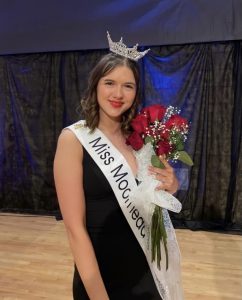With the midterm elections coming up, all eyes are on a new face in North Dakota for the sole seat in the House of Representatives. Cara Mund, a Bismarck native, former Miss North Dakota, and the first North Dakotan to win Miss America, is leading a grassroots campaign for the seat against incumbent Kelly Armstrong as an independent.
After graduating from Harvard Law in May of this year, Mund came back to North Dakota and started work on her campaign. She has made it clear she is not taking PAC funding and one of the main reasons for her entrance into the race was the Dobbs decision and the attack on women’s abortion healthcare.
In an interview with Joel Heitkamp, Mund stated that her first goal if elected would be to codify Roe to secure women’s rights, reinstating the precedent set more than 50 years ago. Her pageant background has made this journey one with many obstacles and challenges. Many, like InForum writer Rob Post, have written several articles targeting Mund’s campaign, with articles featuring headlines like “Could Cara Mund, yet another celebrity candidate, really win in North Dakota”, “Still waiting to find some substance in Cara Mund’s nascent congressional campaign”, and “Let’s acknowledge the deceit at the heart of Cara Mund’s US house campaign.” These headlines are opinion based and the articles commonly refer to her as a “beauty queen” instead of her name, Cara Mund.

Mund’s time in the Miss America organization helped her network national and gain leadership experience. This experience is however, seemingly tossed aside as the “beauty queen” narrative runs rampant.
The Miss America competition has remained a reigning tradition, beginning in 1921. According to missamerica.org, the organization added scholarships to the program in the 1940s in a way to appeal to more women, as the focus was on soldiers in World War II at the time, and since has remained the largest scholarship provider for women.
By the 1970s, the winners of Miss America were pursuing professional careers and by the 1990s, each contestant was required to have a platform issue to take along with them, as the winner would continue this platform through their speaking tour. The Miss America organization, through these changes, has distanced itself from the “beauty queen” narrative and emphasized community engagement and female empowerment to establish its continuing relevancy in the modern world.
Despite the organization’s efforts, women who participate in pageantry are still being stereotyped and seen as “dumb” and “just beauty queens.” Cara Mund spoke out about her thoughts on the leadership of the Miss America organization. In The Washington Post, Mund said that she had been “sidelined at key meetings and media events, undermined by pageant staff, criticized for her clothing choices and barred from penning her own social-media posts.”
After Mund spoke publicly about her experience in the Press of Atlantic City, her farewell speech was reduced to 30 seconds. The pageant industry has its flaws, but there is no space for the discrimination against women that find opportunities and community through pageants.

Concordia senior and double major in Theater Studies and Biology, Abigail Vogeler, is currently Miss Moorhead, with her winning pageant being her first pageant ever. Vogeler talked of the positivity and support she found in the pageant community, “when I did my first and only pageant, I felt so supported by the other women even though we were all competing for the same title.”
It was not a competition of women being pitted against each other but a positive environment for women to thrive. Vogeler emphasized how inspiring the pageant was, “doing these pageants and meeting other people is a great way to learn from the people who have things that you want to see yourself doing.” In relation to Cara Mund, it is interesting to look at how her career has been shaped by her history of pageants.
Pageants help grow confidence, skills in public speaking, and networking opportunities, as a large portion of the judging focuses on speaking and community impact. Therefore, Vogeler expresses that “it does not surprise me why so many women who compete in pageants pursue law or campaign for office.”
Pageants are not contests of the “dumb and beautiful,” in contrast, they are contests that maximize community impact and give intelligent women the tools to pursue careers in a wide variety of male-dominated professions.
I also spoke with Whitney McClain, who works in the Career Center at Concordia and is currently Miss Northwest. She has competed in pageants throughout her time in high school and continues to be involved with pageants. McClain expressed that there is a negative stereotype for women who compete in pageants, and many people think that “if you are in a pageant, you must look like this and you have to come from this background” and “if you are in pageants, you’re probably not that smart because it’s just a beauty pageant,” McClain said.

This perception of pageants is demeaning to women and their hard work to create meaningful impact in the world and career opportunities for their future. McClain said that she had met with many people who are interested in pageants but don’t know where to start or if they have a place in that industry. Many do not believe they fit the “cookie-cutter mold of how they (pageants) are portrayed in the movies,” McClain said, but she argues that it’s important to recognize this stereotype and think beyond what is commonly believed about pageants and the women who find a community within them. Through pageants, women receive great mentorship and work towards professional goals, many of which are undermined through the continuous “beauty queen” concept. Cara Mund just one example of this, but remains true to herself and her dedication to North Dakota and women across the area.

